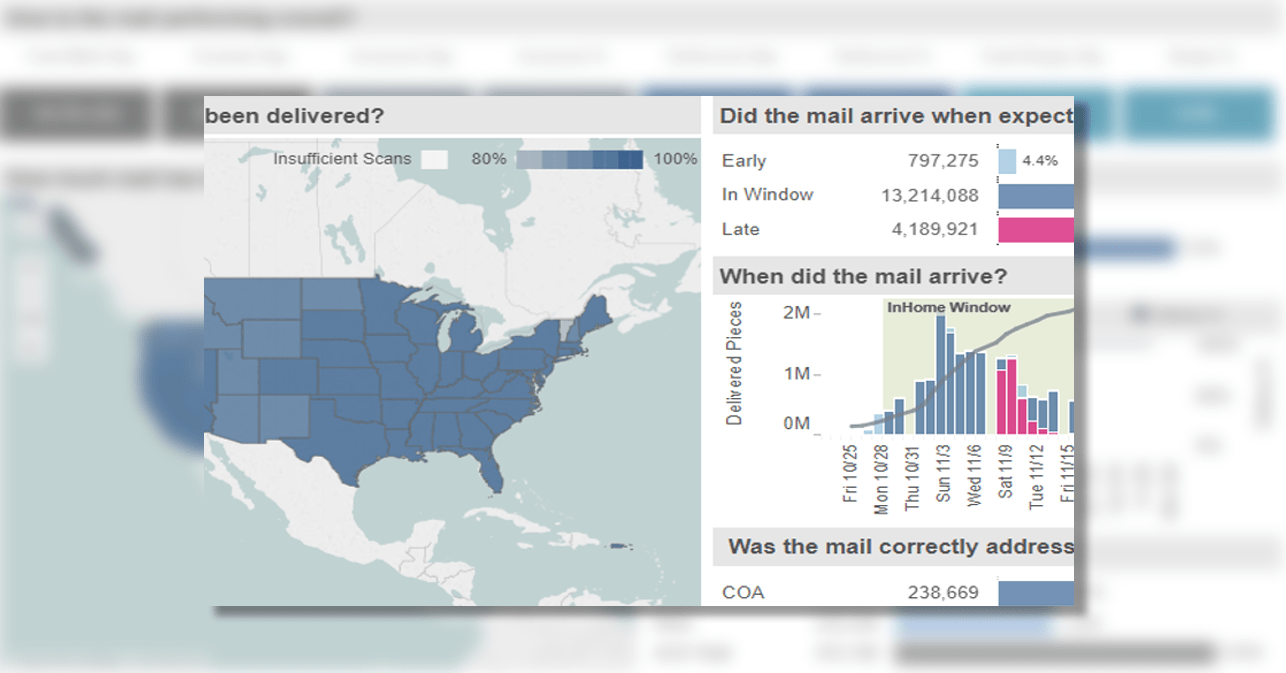USPS® slowdown demands greater visibility to manage delivery uncertainty
By Josh McCaully
Delays in mail delivery and no visibility into the status of those mail pieces caused an increased number of customer inquiries and complaints in the months before and even now after the holidays. The situation has identified an issue that most mailers are confronted with – the absence of data in their campaigns.
So, as the pandemic has created changes in workplace practices to accommodate remote workers, virtual conferences, and meeting the needs of customers, so must those using mail as a critical communication process make changes now to adapt to the new normal of the USPS.
Even when service stabilizes, as a mailer you are going to need greater visibility to manage both the reality and the expectations from senior members of your company that could cover many different departments besides postal.

Not knowing is no longer an option.
Free data is nothing on its own
Some companies rely on their access to free tracking data available from the USPS to import into their existing system to gain some level of understanding of the status of their mailings. That data is difficult to interpret.
GrayHair taps into that same free data. The data alone is of no use to anyone. It needs to be compared against what you mail, so the effectiveness of the system built around the data is what matters.
Most people build a system they consider good enough for their needs. But, with the unpredictable state of the mailstream, good enough isn’t good enough. Mail delivery needs to be monitored and data needs to deliver valuable insights. Those insights provide the kind of answers needed to address and resolve specific delivery issues.
Mailers need to be proactive in managing delivery issues and have a system in place to respond to inquiries coming directly from the customer or even senior management. Issues such as undelivered policies or credit cards quickly turn into red alert customer complaints and can quickly find themselves in the hands of a person with a C Suite title. Understanding the available delivery data and being able to interpret it in a useful matter is critical. I would say that if you are a high-volume mailer having access to this data will is key to monitoring delays, locating trends, and resolving issues.
Visibility is your insight
I have been working with major corporations, their partners, clients, and vendors for the past twenty years. Detailed delivery data has been available in one form or another since the 1990s (since the existence of the PLANET Code, if you remember that), though most cannot get access it to leverage it in ways that are useful. When you do, that delivery performance information opens a window into your mail operations and gives you a level of visibility that changes how many companies I have seen run their business.
That visibility is the main aspect of the control you need. To understand where your mail’s location, down to the individual piece, whether it is in an SPF, or with a vendor, or in a worst-case scenario, has gone missing, is a game-changer.
Companies that have taken the necessary steps to gain access to useful data are ahead of the visibility curve. Real-time status of a mail piece’s location; projected in-home delivery dates; and the percentage of how much of a job or campaign has been delivered are among the insights and information you can see at a glance.

Useful data insights can be accessed through easy-to-read dashboards that present important mail delivery data to a mailer, making it simple to proactively monitor trends and resolve issues.
Delivery data provides benefits across the enterprise
I continue to see an overall concern and dissatisfaction over delayed and undelivered mail with people throughout numerous organizations, with problems surfacing in call centers, accounts payable departments, and across social media.
In many companies, that is when senior management began asking mail operations questions, such as “How can we see what happened to this customer’s mail?”, Was this mail delivered?”, “How can we understand where all of our customer mail is?”, “How do we fix this problem and make them happy?”, as well as I’m sure numerous other questions that having any form of delivery data will solve.
Many large mail owners have been utilizing this delivery data for years to generate reports to meet their own business value. By customizing data feeds and dashboards to focus only on priority data, they optimize delivery performance. Beyond that, data visibility can be of value to other departments in the organization,not just the postal operations or anyone touching marketing campaigns.
What I call “actionable data” can benefit anyone in marketing looking to enhance campaigns by triggering social or email from mail scans, to call centers, where knowing if a customer has received a critical piece of mail can help eleviate headaches on both sides of the phone and help in monitoring fraudulent activity.
Data insights can call attention to fraudulent activity for example when a credit card fails to arrive to the customer in an acceptable amount of time. This delay is now enhanced with the overstating of the postal service. When you start connecting the data, this data can be made accessible to call centers to give timely status updates to callers and resolve an issue. The benefits are limitless, and all contribute to creating a more positive customer experience.
At the receiving end of every piece of mail is a customer
The arrival of critical mail like new credit cards, membership cards, insurance policies, checks, and even marketing offers matters a lot ro customers. To remain competitive today, you need to know where you mail is at tin the delivery journey.
Customer expectations have never been higher than they are today. A recent poll shows that 33 percent of customers would consider switching to the competition after one bad incident. I can see one misdirected mailing being the cause of a wave of customers looking at alternate companies for their insurance or banking needs.
As demand continues for answers to hard questions about where mail pieces are and when they will arrive, they need to gain access to useful data that provides those answers will grow.
Changing times require companies doing large mailings to ensure the best delivery performance and to compete for customer loyalty. The bar has been reset. Excellence in delivery performance starts and ends with data visibility.
Article originally published in Mailing Systems Technology

Josh McCaully is Managing Director Solutions Architecture for GrayHair Software. For the past 20+ years, Josh has gained a deep knowledge of the challenges that enterprise mailers and mail service providers face in the areas of postal operations, data management, and campaign success. He is a leading postal expert in operations and campaigns of the large mailers and their vendors, delivery optimization, and data analytics. You can reach Josh at jmccaully@grayhairsoftware.com or connect with him on LinkedIn.
If you enjoyed this article then we think you will enjoy our webinar:
